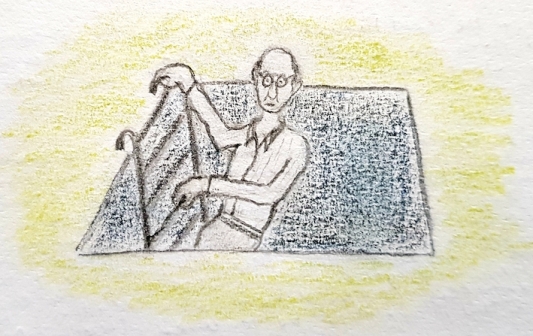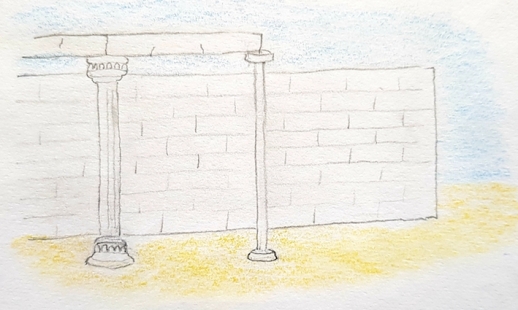Out from the underground came a visiting psychologist. Short and bald he was a behavioural psychologist. The modern father of the subject. He came to give a talk. My friend Maria had organised the event. Me, the psychologist, and another guy went on a walk. The psychologist said Freud was overrated and lucky with a few insights. We got back to the hole. I burst out laughing and rolled around on the grass. I found it hilarious that the psychologist would have to crawl back down that hole.

I had this dream while saying with Maria in Hong Kong where, as a guest, I had to be conscious of my behaviour at all times. I always enjoy being a guest as for whatever reason these living conditions seem to bring out the best in me. It’s as if this rarely expressed personality trait of mine comes crawling out from his hole to show itself to the world. The dream also had a psych undertow since the bespectacled man came out from the deeper recesses of my being. He was a psychologist, a fact that disappointed me because I’m skeptical of the profession and would loath being one. Unarguably they perform a social good, however, I can’t help but feel they fill a void created by materialism and secularism. In years gone by priests and tight family units fulfilled their social role whereas now we have a pay-as-you-go atomised world of substitute industries offering magic panaceas, industries bereft of true love and compassion, which incidentally, are the very things those heavy of heart seek.
Prejudice aside, I do have an interest in behavioural psychology. It’s a science with measurable outcomes. But the scientist in me questions. One question has to do with the generation of false positive results. The majority of people tend to mirror each other and act in ways to obtain benefit. This means that once a person figures out a way to obtain the benefit of a system they are being subjected to they will repeat that behaviour. This makes the question or operating hypothesis of a behavioural experiment critical to any analysis, which concerns me because as I see it the question maker has the power to determine human behaviour through molding questions. This is also a pertinent problem in the analysis of dreams. If I believed that sexual impulse lay at the root of all dreams and interpreted them from that point of view AND if I was loud enough so that enough people heard me expound this belief could I change the way people see dreams? Similarly, if I were to research whether a vitamin improves dream recall how can I mitigate for the effect my interest in the dreams of my dream subjects will have on their ability to recall dreams? (http://www.abc.net.au/news/2015-09-23/university-of-adelaide-begins-study-into-dream-recall/6798904). From my humble experience I’ve found that having a regular cup of coffee with my friends improves their ability to recall dreams because they know of my talking point interest in dreams. And then there’s Prozac, the elixir of happiness, which according to some clinical trials is no better than the placebo. The power of suggestion and its influence on the operations of the mind is a vexing problem. (https://www.ncbi.nlm.nih.gov/pmc/articles/PMC4592645/).
So lets drink coffee and go to church
Our strength of being an illusionary tree
It’s more akin to a pillar of salt
That sags when it rains
Freud is the foundation on which our modern view of dreams is built. I have difficulty with some of his claims (the self-evident misnomer of the Oedipus complex and wish fulfilment as an overriding dream mechanism). Perhaps his lucky insight came with the observation that the unconscious is the opposite of conscious assertions, i.e. undesired ideas, OR is that because I agree with this deduction of his (as written in the haunted house dream from August 2015)? Freud’s unpacking of dream content through association has become the way modern culture looks at dreams. However, a justifiable criticism of this approach is that these associations are external to the dream and as such are subjective and therefore spurious. But there is validity to Freud’s approach since one cannot argue that memory features heavily in dream content and to that we can add Freud’s success as a clinician.
So what’s my issue with Freud? The further I travel along the journey of dreams the more I’ve found myself giving credence to the images I see. If I do that I find my recall of the dream feels right. For example, when I met the lady with frizzy grey hair (December 2017) I didn’t try to project her image on to someone I know or knew. I accepted her for what and who she ‘is’ and found that orientation deeply satisfying. The same goes for the desert I’ve begun to traverse in recent months. When I accept the desert as real and not a projection of something else it feels right. Feelings matter in dreams. They bring fantasy to life. Within dreams we can fly to the moon and travel to the centre of the Earth. We can transcend the daily humdrum of waking life to walk in the footsteps of the Gods …
The desert segue brings me to the dream of an ancient library that stood in the Palmyran desert. The ruined building reminded me of Hadrian’s library at Athens. I won’t describe this dream in detail except to say that within this dream I was half-heartedly searching for books on botany and science fiction. These books constitute the body of knowledge I amassed as part of my professional life. That edifice has fallen into ruin. However, the search for books implies my quest for knowledge has not ended. It’s up to me to sort out the mess and repair my temple of knowledge.

Right, time to crawl back into that hole …